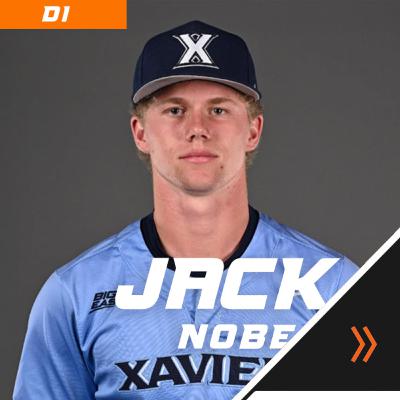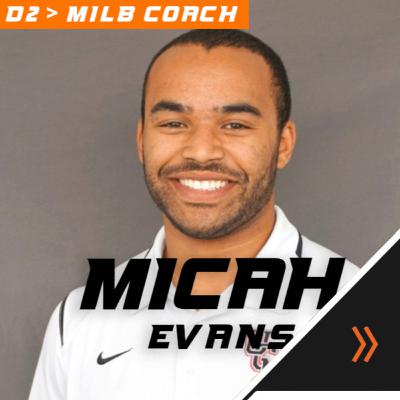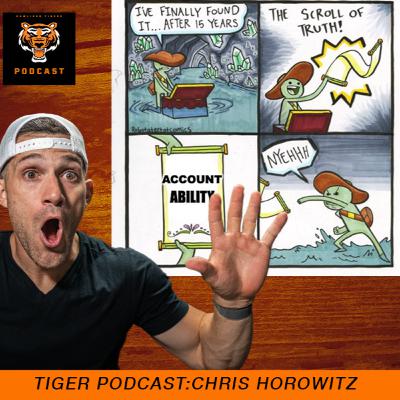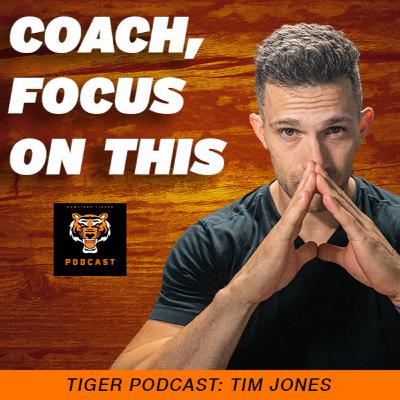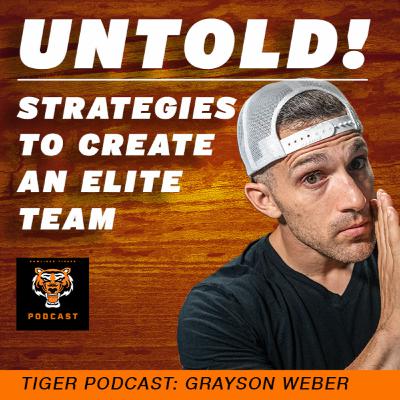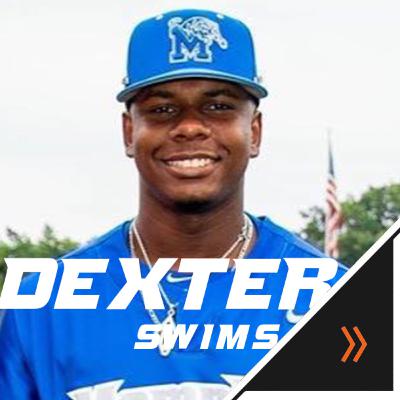Discover Rawlings Tigers Podcast
Rawlings Tigers Podcast

Rawlings Tigers Podcast
Author: Rawlings Tigers
Subscribed: 2Played: 0Subscribe
Share
© Rawlings Tigers
Description
Emerging from humble beginnings to having over 300 Rawlings Tigers teams, over 500 college commitments, and 8 players playing affiliated baseball this podcast is a look inside how the Tiger view player development. You'll find on this channel: alumni case study interviews, current and past coach interviews, and tips that can boost your player's career closer to the next level.
64 Episodes
Reverse
Join Payne Kent, a 2027 graduate from St. Louis, MO, on this Rawlings Tigers recruiting podcast episode as he shares his innovative approach to getting noticed by college coaches. Tired of generic highlight reels and cold emails? Payne’s conversational format lets coaches see the real him—first baseman, pitcher, and debate team member with a passion for finance and stats. Learn how he uses YouTube interviews to research coaches, draws inspiration from MLB legends like Mark Teixeira, and balances success (topping 87 mph post-injury) with failures (walk-off losses) to grow. Perfect for high school players seeking a recruiting edge and coaches scouting versatile, personable talent. Recorded June 16, 2025.Timestamps (Chapters):0:00 - Introduction: Meet Payne Kent1:45 - Why a Podcast for Recruiting?3:06 - Positions Played: First Base, Pitching, More3:31 - College Goals: Finance and Stats on Wall Street4:47 - Debate Team: Building Persuasion Skills7:16 - Baseball as Persuasion: Umpire and Fan Dynamics8:16 - College Search: Finding the Right Program10:28 - Spring Season Recap at Lafayette High10:48 - Summer Goals: Versatility and Bonding12:06 - Player Comparison: Mark Teixeira Style13:23 - Biggest Success: 87 MPH Comeback14:56 - Biggest Failure: Learning from Walk-Offs19:08 - Hobbies: Legos, Thought-Provoking Movies21:39 - Strengths and Weaknesses as a Player24:01 - Program Priorities: Success and Coach TenureCall to Action:👍 Like and subscribe for more Rawlings Tigers recruiting tips! High school players—email spiker@rawlingstigers.com or DM @RawlingsTigers on Instagram to start your own podcast. Coaches, connect with Payne and the Tigers at rawlingstigers.com.
Step into the intense journey of Connor McCaleb, a Rawlings Tigers alum and pitcher now at Eastern Michigan University, in this gripping Rawlings Tigers podcast episode. Hailing from St. Louis, Missouri, Connor reveals how he escaped a chaotic freshman year at Christian Brothers University—plagued by academic probation and coaching turnover—to thrive at Mineral Area Junior College, where showcase games landed him a Division I scholarship. Learn his top pitcher training tips, the power of posting on Twitter for recruiting, and why he chose to forge his own path apart from twin brother Carson. Discover how JuCo baseball in 2025 offers unmatched opportunities for development and scholarships, making this a must-watch for aspiring athletes and parents!Timestamp Highlights:00:04:04 – Connor’s rocky start at Christian Brothers and transfer to JuCo00:13:44 – Dominating JuCo showcases to earn Eastern Michigan’s attention00:21:51 – Pitcher training: Throwing program and weight room growth00:23:43 – Best recruiting advice: Leveraging Twitter for exposure00:25:20 – Growing up as twins: Splitting paths with CarsonLike, subscribe, and hit the bell for more JuCo baseball and recruiting insights! Share your training or recruiting story in the comments below. Follow Connor on X for updates, and visit rawlingstigers.com to join our community!
John is a freshman at Massachusetts Institute of Technology. He shares his story on his recruiting process and his approach to getting into one of the hardest schools in the United States.
Join us on the Rawlings Tigers podcast as we sit down with Carson McCaleb, a switch-hitting catcher at Mineral Area Junior College and a St. Louis native with a unique recruiting journey. From navigating COVID-era challenges to transferring from Christian Brothers University, Carson opens up about his gritty JuCo experience, the mental demands of switch-hitting and catching, and his drive to win a championship. In this episode, he shares how he’s securing scholarship offers to support his parents financially, easing their burden while chasing Division I dreams alongside his twin brother, Connor. Packed with insights on asking the right recruiting questions and balancing academics with baseball, Carson’s story is a must-hear for young athletes and families.Notes:Timestamp: 00:06:23 – Carson’s recruiting journey: High school to Christian Brothers to Mineral Area00:08:36 – The challenges of switch-hitting and catching in recruiting00:13:22 – JuCo experience: Gritty fall at Mineral Area vs. Division II00:32:04 – Securing scholarships to help his parents financially00:29:23 – Tips on asking the right recruiting questionsLike, subscribe, and hit the bell for more Rawlings Tigers podcasts! Share your recruiting or scholarship tips in the comments below. Follow Carson on X (@CarsonMccaleb) for updates, and visit rawlingstigers.com to join our community!
Dive into the Rawlings Tigers podcast featuring Gavin Oswald, a University of North Alabama pitcher and St. Louis native, as he shares his gripping journey through college baseball. In this episode, Gavin reveals how he navigated the chaotic COVID-era recruiting process, survived multiple transfers—from junior college to Oklahoma, Wichita State, and North Alabama—and mastered the transfer portal’s high-pressure timeline. Get insider tips on decoding coach conversations, building authentic relationships, and staying in Division I baseball despite setbacks. Learn why Gavin credits his Rawlings Tigers roots for his grit and how his advice can help young athletes facing today’s recruiting challenges. Perfect for baseball players, parents, and coaches!Notes:Timestamp Highlights: 00:01:12 – Intro to Gavin’s COVID-era recruiting journey00:14:24 – Gavin’s transfer saga: Oklahoma, Wichita State, North Alabama00:50:10 – Decoding coach conversations and navigating the transfer portal01:10:56 – Advice for high school athletes on staying visible and trusting the processLike, subscribe, and hit the bell for more Rawlings Tigers stories! Share your recruiting questions in the comments, and check out rawlingstigers.com. Follow Gavin on Twitter (@GavinOswald6) for updates.
Meet JD McReynolds, a Rawlings Tigers alum and University of Central Missouri pitcher who’s thrown 95 MPH and competed in the Cape Cod League. In this exclusive interview, JD shares his journey from Sullivan, Missouri, through the chaotic COVID recruiting process, to becoming a key arm at UCM while pursuing a mechanical engineering degree. Discover how the Tigers shaped his fierce competitive mindset, his advice for young players, and why he chose UCM’s blue-collar baseball culture. Perfect for baseball fans, aspiring athletes, and Rawlings Tigers families! Don’t forget to like, subscribe, and hit the bell for more inspiring stories from the diamond.
Dual coaching lives. Ryan Lindemann shares his coaching experience in two different generations. Once, as high school baseball coach and then in two different cycles of youth baseball with his sons.
He reveals what worked, what was difficult, and the opportunities we have today to develop strong players.
In an engaging and insightful podcast episode, a seasoned coach lays bare the evolving dynamics of youth sports coaching, offering a refreshing approach that prioritizes mental and emotional well-being. The conversation unfolds as a masterclass in understanding athletes’ struggles and traumas, underscoring the importance of meeting players where they are—both mentally and physically.
The coach highlights the necessity for coaches to set aside personal issues, fostering an environment where individual progress fuels team success. Through anecdotes and strategies, the discussion explores the power of creativity in coaching, from designing individualized defensive drills in tight spaces to emphasizing fundamentals before chasing metrics like bat speed or power.
At its heart, the episode celebrates the profound role of patience, observation, and collaboration in shaping young athletes. Coaches are encouraged to implement routines that build good habits, develop pitch recognition, and give players a sense of ownership over their training. Ultimately, this thoughtful conversation reframes coaching as an art form, where the goal is not conformity but the cultivation of unique talent and love for the game.
Whether you're a coach, a parent, or a sports enthusiast, this episode offers a compelling reminder: the true essence of coaching lies in guiding players through personal growth, one step—and one pitch—at a time.
In this interview, Andrew Wilde, head coach of the Salt Lake City Tigers, delves into the organization's approach to baseball coaching, emphasizing player development over immediate wins. The discussion highlights several key areas:
Player Development vs. Winning: Wilde stresses the importance of balancing player growth with competitive success. The organization focuses on building athleticism, power, and aggressiveness at the bat, prioritizing long-term player potential over short-term victories.
Buy-In and Routine: A significant part of the conversation revolves around increasing player and parental buy-in through structured training routines. High school players have shown success with this approach, but there's a push to extend this commitment to younger demographics.
Offseason Challenges: Winter training in Utah presents unique challenges, particularly with arm care. The organization is working on providing better access to facilities and encouraging continuous, albeit modified, arm movement to prevent injuries without taking long breaks.
Training Methods: Specific techniques like using overload and underload bats for increasing bat speed, long toss exercises in confined spaces, and situational baseball IQ are discussed. The importance of differentiating between injury and soreness is also highlighted with strategies to manage the latter.
Organizational Growth: There's an expressed desire for more baseball complexes in Utah and the potential for private equity investment in expanding facilities to the Midwest and East Coast. The conversation also touches on the need to enhance the program's social media presence and recruit dedicated instructors.
Coaching Philosophy and Challenges: Wilde shares the coaching philosophy of continuous learning, the need for a better balance between development and winning games, and the organizational structure's challenges, including coach buy-in and managing the program's operations single-handedly.
Action Items: The interview concludes with a list of actionable steps, from expanding training facilities, focusing on arm care, increasing player engagement, to exploring new competitive opportunities and enhancing the coaching staff's alignment with the program's vision.
This interview not only provides insights into the operational and strategic side of running a baseball program but also offers practical advice for coaches, players, and parents involved in youth and high school baseball development.
Going from a powerhouse D2 baseball program to an MiLB Coach. Micah Evans shares his journey from being recruited, to competing for a National Championship, and ultimately joining the New York Mets minor league system.
The path to success in baseball is often paved with challenges, self-reflection, and moments of growth. For one player, this journey has been a mix of gratitude, determination, and an evolving sense of identity. Looking back, Kenny Piper shares valuable insights into what it means to truly succeed—on and off the field.
Grateful for the Journey
Kenny Piper begins by expressing deep gratitude for their current position, acknowledging the choices and sacrifices that shaped their path. While the road hasn’t been without its share of doubt and questioning, a steadfast focus on their goal kept them moving forward, even in the face of adversity.
Beyond the Diamond: Finding Identity and Fulfillment
An essential realization along the way was that success in baseball does not solely define one’s value or identity. Kenny emphasizes the importance of finding fulfillment outside the game, whether through faith, community involvement, or personal growth. This broader perspective helped them maintain balance and avoid the pitfalls of measuring worth by performance alone.
Leveling the Playing Field
No matter the level or title, Kenny reminds us that once players step onto the field, everyone is equal. The shared love of the game and the competitive spirit unite players in a way that transcends accolades or status. This humility has been a cornerstone of their mindset and approach.
Support Systems and the Role of the Tigers Organization
The speaker attributes much of their success to their inner circle—parents, a supportive spouse, and others who stood by them through the ups and downs. Equally important was the impact of the Tigers organization, which helped prepare them for the next stage of their career in college. The Tigers provided not just technical training but also a foundation of values and discipline that set the speaker up for long-term success.
Embracing the Unknown
In some cases, the speaker reflects, ignorance can be bliss. Whether it’s discovering new technology, navigating career milestones, or adjusting to change, there’s value in embracing uncertainty and learning along the way. This mindset has been crucial in adapting to the challenges of a dynamic and demanding sport.
Final Thoughts
For Kenny, the journey through baseball has been about much more than wins or titles. It’s a story of perseverance, gratitude, and finding purpose beyond the scoreboard. Whether navigating the challenges of a professional career or pondering the future of the sport, the lessons learned on and off the field remain invaluable.
Accountability isn’t just a buzzword; it’s the secret to unlocking success for both individuals and teams. In this video, we dive deep into how self-awareness, commitment, and teamwork can transform your approach to coaching and leadership. Inspired by real-world coaching experiences, this discussion highlights the importance of fun, character development, and creating teaching moments for growth. Whether you're coaching left-handed hitters, guiding young players, or building a cohesive team, accountability is your ultimate tool for success. Learn how to foster a winning mindset, balance expectations, and motivate your team to achieve their dreams!"
Key Takeaways:
The role of accountability in personal and team success.
How to create fun and meaningful teaching moments during games.
Strategies for developing committed players with good character.
The importance of balancing expectations with advanced knowledge.
When it comes to building a successful baseball program, Coach Tim Jones knows that it’s not just about wins and losses—it’s about creating a culture that fosters player development, teamwork, and a love for the game. In a recent conversation, Coach Jones shared insights on recruiting new players, overcoming challenges, and the key principles that shape his approach to coaching.
Recruiting new players is a pivotal part of team development, and Coach Jones emphasizes that it’s not about chasing talent alone. Instead, the focus is on finding players—and families—who align with the team’s culture. He invites potential recruits to experience the program firsthand, offering tryouts that provide a glimpse into what it means to be part of the team.
Honest feedback is a cornerstone of his approach. After tryouts, players receive constructive evaluations that highlight both their strengths and areas for improvement. This process not only helps players grow but also ensures they understand the team’s commitment to development.
A strong team culture is the foundation of Coach Jones's philosophy. Connecting with players on a personal level is vital to building trust and camaraderie. For younger athletes, he stresses the importance of simplicity and fun. “When kids enjoy what they’re doing, they’re more open and excited,” he shared. This excitement becomes the spark that fuels their passion for the game.
Safety and skill equity are also priorities. By combining age groups and allowing players to play up or down, the program creates competitive yet safe environments tailored to individual abilities. This approach not only enhances gameplay but also exposes players to a variety of experiences and challenges.
For Coach Jones, developing players goes beyond teaching mechanics—it’s about fostering mental toughness and understanding the intricacies of the game within the game. Engaging players with questions and encouraging positive reinforcement are essential tools in his coaching toolkit. This method helps players stay mentally sharp and builds resilience, which translates into success both on and off the field.
Coach Jones believes that passion and excitement for the game are just as important as raw talent. “You can’t teach passion,” he notes. By prioritizing players who are eager to learn and grow, he ensures the team remains motivated and unified. This mindset is especially impactful for younger players who may not yet have honed their skills but demonstrate a genuine love for baseball.
At the heart of Coach Jones's mission is the desire to grow the sport. He knows that fostering a love for baseball in his players will have a ripple effect, inspiring others to join the game. Through intentional recruiting, a focus on development, and a dedication to positive culture, Coach Jones is helping to shape not just better athletes, but better individuals.
By simplifying the game for younger players, creating equitable opportunities, and fostering a supportive environment, Coach Tim Jones exemplifies what it means to lead with purpose. His philosophy ensures that the lessons learned on the field carry over into every aspect of his players’ lives.
A Journey of Dedication in Baseball
Transitioning from professional practices to personal experiences, Erik Miller shares his journey in baseball. Realizing their potential in high school, they aspired to play at the collegiate and professional levels. With unwavering support from their parents, who provided guidance and resources, they embarked on a path of rigorous training and self-improvement.
The Role of Hard Work and Education
Understanding the competitive nature of the sport, they emphasized the importance of hard work and prioritizing education. By seeking additional resources and facilities, they continuously sought ways to gain an edge over others. This dedication not only honed their physical abilities but also reinforced the value of discipline and perseverance.
Mental Focus and Preparation
The conversation delved into the mental aspects of baseball, emphasizing how focus and mental strength are crucial components of performance. The speaker highlighted their approach to managing workload, particularly the importance of not overexerting their arm to remain ready for the next season. They stressed avoiding complacency, constantly pushing themselves to improve without becoming too comfortable.
The Art of Pitching
A key takeaway was the emphasis on throwing strikes consistently at every career level. Pitchers are encouraged to focus on feeling confident and comfortable with their pitches rather than striving for overly precise placements. This approach allows for a more natural and effective pitching style, leveraging one's strengths without unnecessary pressure.
Relievers' Approach and Adaptability
For relievers, the strategy often involves a more general approach, concentrating on personal strengths instead of targeting specific locations. The effectiveness of a pitcher's performance is influenced more by the lineup they face than the starting pitcher they follow. This perspective underscores the need for adaptability and situational awareness in the game.
Controlling the Controllables
A recurring theme was the advice to control what you can control and not let external factors or comparisons to others affect performance. By focusing on personal growth and mental resilience, individuals can navigate challenges more effectively. The speaker advocated for learning from seasoned players, engaging in valuable conversations, and embracing mentorship opportunities to enhance skills and knowledge.
www.rawlingstigers.com
Rawlings Tigers Baseball
(SUBSCRIBE)
Whitt Callahan, a senior infielder at Spalding University in Louisville, Kentucky, joins Carter Mize on this episode of Tiger Alumni Player Spotlight.A Southern Indiana Rawlings Tigers alum, Callahan played four full summer seasons with the Tigers from 15U to 18U before beginning his collegiate career at Spalding.Reflecting on his time with the Tigers, Callahan shared: "I played all my high school summers with the Tigers. I'm really glad I did—it gave me the reps and exposure I needed to connect with college coaches and make my way into college baseball."Callahan’s path to college baseball is unconventional in today’s era of frequent transfers. Preparing for his final season of eligibility, he has stuck at Spalding University throughout his collegiate journey.The senior infielder found Spalding after the Southern Indiana Rawlings Tigers held a private workout for Spalding’s coaching staff to see.“There were about 10 of us that attended this mini-camp that Spalding was high on. After that workout they brought me into the locker room and offered me a spot. In Division 3 there are no athletic scholarships so we didn't talk about any scholarship money obviously but I really liked the campus and facilities. It didn't take me long to commit at all.”The infielder has played in 75 games over 3 seasons for Spalding playing both third base, and second base.“I’ve played a large majority of third base here, with some spot starts at second base sprinkled in. If you hit, you play so I just play wherever they put me.” Winning is a hallmark of Spalding's baseball program. The NCAA Division III team has captured back-to-back SLIAC conference titles, with Callahan playing a key role in their success. In the 2024 SLIAC conference final, he hit a two-run home run, bringing his season total to a career."I never thought about transferring out of Spalding. I love it here—they push me every day, and I’ve become a much better player since I first arrived. Plus, we win all the time, which always makes it fun," he said.As Whitt enters his final season of eligibility, the Rawlings Tigers community wish him the best as he looks to cap his time at spalding off with an all-SLIAC caliber season.
1. Coaching Philosophy: Simplicity and FundamentalsDJ's coaching philosophy centers on simplifying the game. Whether it’s teaching players to "hit the big part of the barrel" or guiding young pitchers to focus on direction and movement toward the catcher's mitt, the emphasis remains on mastering the basics. For pitchers, the message is clear: a fastball and perhaps a cutter, combined with accuracy and trust in the defense, are sufficient tools to excel.
2. Player Development: Building Strength and VersatilityA strong foundation in core and leg strength was highlighted as critical for developing arm strength and throwing harder. DJ stressed the importance of variety in pitches to disrupt batters' timing and the need for pitchers to prioritize throwing strikes and mastering location. Beyond physical skills, players are encouraged to embrace versatility by learning multiple positions, making them more valuable assets to their teams.
3. The Importance of Trust, Flexibility, and IndividualizationTrust plays a central role in DJ’s approach, both in the context of pitchers relying on their defense and coaches building relationships with players. Recognizing the unique personalities and characteristics of each athlete, DJ underscored the importance of tailoring coaching methods to the individual. Flexibility and adaptability, both on and off the field, were identified as keys to success, along with stepping outside comfort zones to foster growth.
4. Navigating Challenges with a Competitive EdgeDespite acknowledging that the overall talent pool may be down, DJ expressed optimism that certain teams can overcome this through hard work and a competitive mindset. High expectations, coupled with a refusal to blame others for failures, create an environment where players can thrive and develop.
In the latest podcast episode, Grayson Weber and I dove deep into the multifaceted world of baseball and softball development, discussing everything from coaching philosophies to cutting-edge technology in training. At the heart of the conversation was a focus on cultivating commitment, versatility, and a genuine love for the game, elements essential to a player's growth both on and off the field.
1. Team Dynamics and Camaraderie
The journey of a team often begins with struggles in communication and cohesion. However, as players spend more time together, a shared sense of camaraderie emerges, fueling their ability to win games. Grayson emphasized that building strong team chemistry is an essential part of any program's success. Organizations with robust frameworks can successfully integrate players from diverse backgrounds, creating a unified force on the field.
2. Youth Coaching Philosophy
Coaching youth players, especially in the 12 to 13-year-old age range, requires a delicate balance of instilling discipline and making the game enjoyable. Grayson highlighted the importance of teaching a “killer mentality,” which encompasses work ethic, energy, and a winning mindset. At the same time, coaches must help players develop confidence, versatility, and accountability, ensuring they are prepared for the unpredictable nature of baseball development.
3. Versatility and Skill Development
One recurring theme was the need for players to avoid pigeonholing themselves into a single position or skill set. Versatility is key, especially for young players who are just beginning to explore their strengths. Starting early in skill development provides a foundation, but switching positions later can be challenging. Encouraging players to embrace a broad range of skills enhances their overall game and keeps more doors open for future opportunities.
4. Commitment to the Grind
Success in baseball is not a straight path, and players must embrace the grind to stand a chance at the professional level. Grayson noted that players need to love the game and dedicate themselves fully to its demands. This commitment includes mastering mechanics, practicing self-awareness, and maintaining body strength through training. Olympic lifting, agility work, and other conditioning techniques play a significant role in building the physicality needed for high performance.
5. Leveraging Technology in Baseball
The game is evolving, and so are its tools. New technologies like virtual reality simulators, such as Win Reality, allow players to practice in game-like scenarios, refining their performance without the pressure of live play. Other tools, like force plates for measuring fast-twitch muscle response, add precision to athlete evaluations, providing insights that traditional methods cannot. These innovations, coupled with metrics like velocity and pitch location, enable coaches to design individualized training programs that emphasize both physical and mental growth.
6. The Bigger Picture
Grayson reminded us that baseball is more than just a game—it’s a platform for building life skills and creating connections. Players are encouraged to develop relationships with professionals outside the game, fostering opportunities for their post-baseball careers. This perspective is vital for families and players to understand as they navigate the challenges of youth sports.
7. Inspiring the Next Generation
The conversation concluded with an emphasis on mindset. Young players must view themselves as the best while remaining humble and open to growth. Coaches play an integral role in shaping this mindset by fostering a positive culture, sharing personal experiences, and leading with authenticity. By doing so, they inspire players to love the game and to pursue their goals with unwavering dedication.
Dexter Swims, a 2018 graduate of the Rawlings Tigers program, found his college home at Missouri Southern State University in Joplin, Missouri. As a freshman in 2018, Swims made an immediate impact in the Division II program, showcasing his skill both at the plate and in the field.In his freshman season, Swims batted an impressive .325, tallying 75 hits, 49 runs, and 36 RBIs. Among his 75 hits, 22 were for extra bases, including 16 doubles, a triple, and five home runs. On defense, he recorded a .978 fielding percentage with 78 putouts, highlighting his well-rounded abilities. His stellar season earned him the titles of MIAA Freshman of the Year and a place on the All-MIAA First Team.Over three years with the Lions, Swims sustained a career batting average of .310, notching 10 home runs and 81 RBIs. After his successful Division II career, he made the jump to Division I, playing at the University of Missouri and later at the University of Memphis.Today, Dexter continues his baseball journey in the professional sphere, working in the Amateur Scouting Department for the Milwaukee Brewers.










